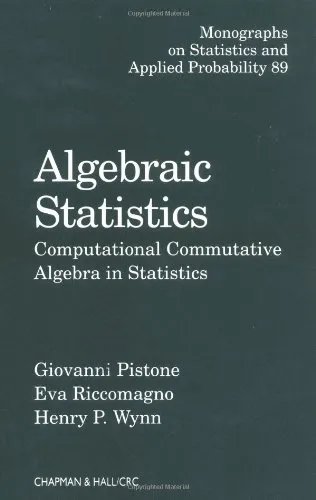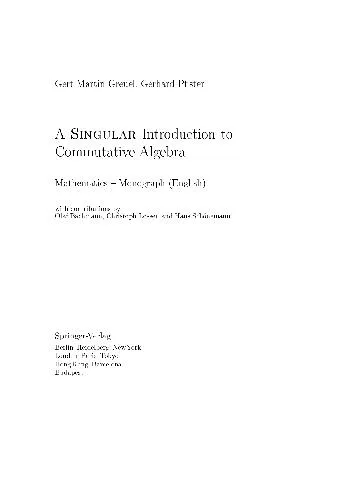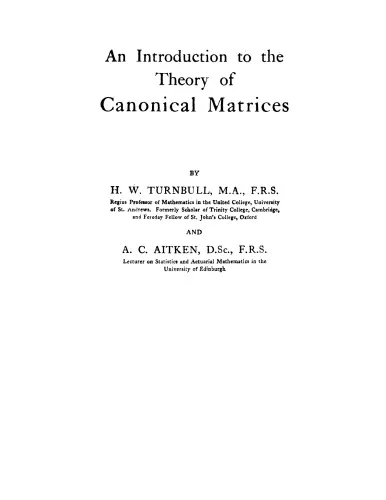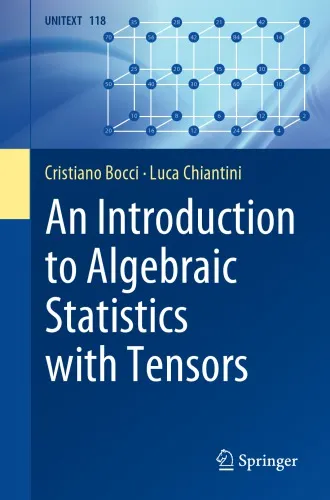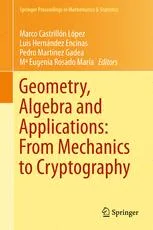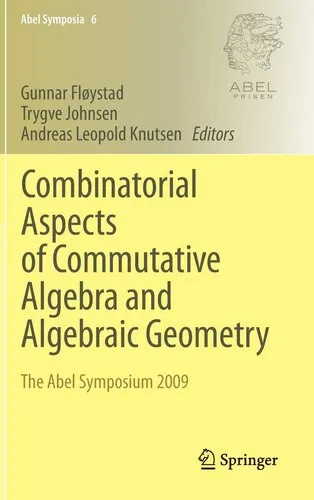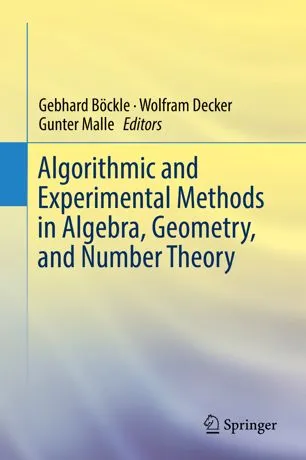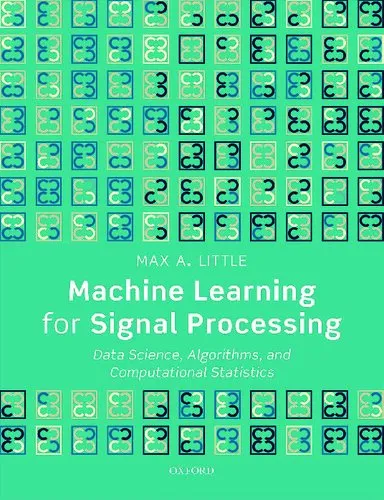Algebraic statistics: computational commutative algebra in statistics
4.5
Reviews from our users

You Can Ask your questions from this book's AI after Login
Each download or ask from book AI costs 2 points. To earn more free points, please visit the Points Guide Page and complete some valuable actions.Related Refrences:
Introduction to "Algebraic Statistics: Computational Commutative Algebra in Statistics"
"Algebraic Statistics: Computational Commutative Algebra in Statistics" is an innovative and foundational text that bridges the gap between abstract algebra, computational techniques, and statistical applications. Written by Giovanni Pistone, Eva Riccomagno, and Henry P. Wynn, this book is a cornerstone in the field of algebraic statistics, delivering a fresh, mathematically rigorous approach to statistical models, inference methods, and data analysis processes.
The text integrates the principles of commutative algebra and geometry into the realm of contemporary statistics, enabling researchers and practitioners to approach models and computations from a new and efficient perspective. Designed for advanced students, statisticians, and researchers across mathematics and data science, this book explores complex topics with clarity, offering insights that reshape how we view both theoretical and applied statistical practices.
Detailed Summary of the Book
The book begins by outlining the fundamental principles of algebraic geometry and commutative algebra, offering readers a clear and concise explanation of topics such as polynomial ideals, Gröbner bases, and toric varieties. These foundational concepts are illustrated within the context of their application to statistical problems. The authors then delve into a variety of models in algebraic statistics, including hierarchical, exponential, and graphical models, demonstrating how algebraic methods provide powerful tools for understanding their structure.
The computational aspect is a key component of this work, providing explicit algorithms and examples that enable readers to engage with theoretical discussions in a hands-on manner. Topics such as maximum likelihood estimation, hypothesis testing, and parameter identifiability are explored using the language of algebraic geometry. Advanced subjects like Markov bases and algebraic exponential families highlight the potential of these tools in cutting-edge statistical practices.
Unlike traditional texts, this book replaces conventional calculus-heavy approaches with algebraic methods, offering new insights into familiar statistical problems. As such, it serves as both a comprehensive introduction to algebraic statistics and a reference guide for advanced applications.
Key Takeaways
- Unified Perspective: The book cohesively integrates algebraic structures with statistical concepts, offering a robust mathematical foundation.
- Tools for Real-World Applications: From parametric modeling to large-scale computational tasks, the methods discussed have direct applications in various scientific fields.
- Algorithmic Insights: Practical algorithms, such as Gröbner bases and computational tools, empower readers to apply mathematical principles to solve real problems.
- Innovative Approach: By using algebraic geometry, the book provides a fresh perspective on classical statistical problems, fostering a deeper understanding of models and computations.
- Comprehensive Coverage: Readers gain insights into diverse topics, from Bayesian networks to experimental design, framed within an algebraic lens.
Famous Quotes from the Book
"The power and elegance of algebraic methods lie in their ability to reveal the underlying structure of statistical models, transcending the limitations of traditional approaches."
"By employing computational commutative algebra, we open the doors to a new realm of possibilities for solving statistical problems that once seemed insurmountable."
"The fusion of algebraic geometry and statistics not only brings clarity to complex models but also paves the way for innovative computational solutions."
Why This Book Matters
The importance of "Algebraic Statistics: Computational Commutative Algebra in Statistics" lies in its groundbreaking synthesis of two previously distinct disciplines. At its core, the book addresses the growing demand for mathematical rigor in statistical modeling and analysis while responding to the need for efficient computational solutions in our data-driven era. The methods presented by the authors promise to transform contemporary statistical practices, offering tools that are both theoretically sound and practically applicable.
In a world increasingly dependent on complex data analysis, the book provides a much-needed framework for tackling intricate statistical problems, empowering mathematicians, data scientists, and statisticians alike. By fostering a deeper understanding of algebraic methods, it equips readers with the skills to navigate the challenges of modern analytics with confidence and creativity.
Ultimately, this book is more than a resource—it is a catalyst for innovation. The authors challenge conventional paradigms, pushing the boundaries of what is possible in the field of statistics. Whether you're an academic, practitioner, or student, "Algebraic Statistics: Computational Commutative Algebra in Statistics" is an indispensable tool for advancing your knowledge and expertise in this evolving domain.
Free Direct Download
You Can Download this book after Login
Accessing books through legal platforms and public libraries not only supports the rights of authors and publishers but also contributes to the sustainability of reading culture. Before downloading, please take a moment to consider these options.
Find this book on other platforms:
WorldCat helps you find books in libraries worldwide.
See ratings, reviews, and discussions on Goodreads.
Find and buy rare or used books on AbeBooks.
1391
بازدید4.5
امتیاز0
نظر98%
رضایتReviews:
4.5
Based on 0 users review
Questions & Answers
Ask questions about this book or help others by answering
No questions yet. Be the first to ask!
